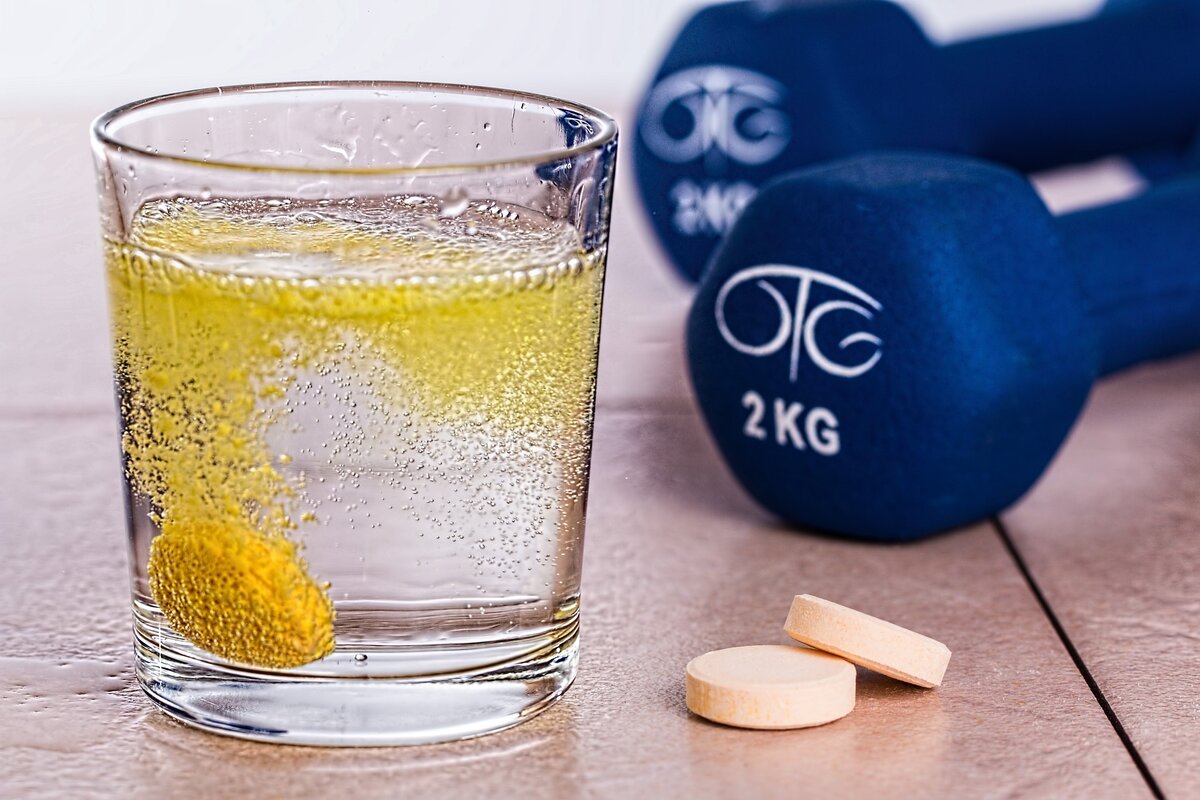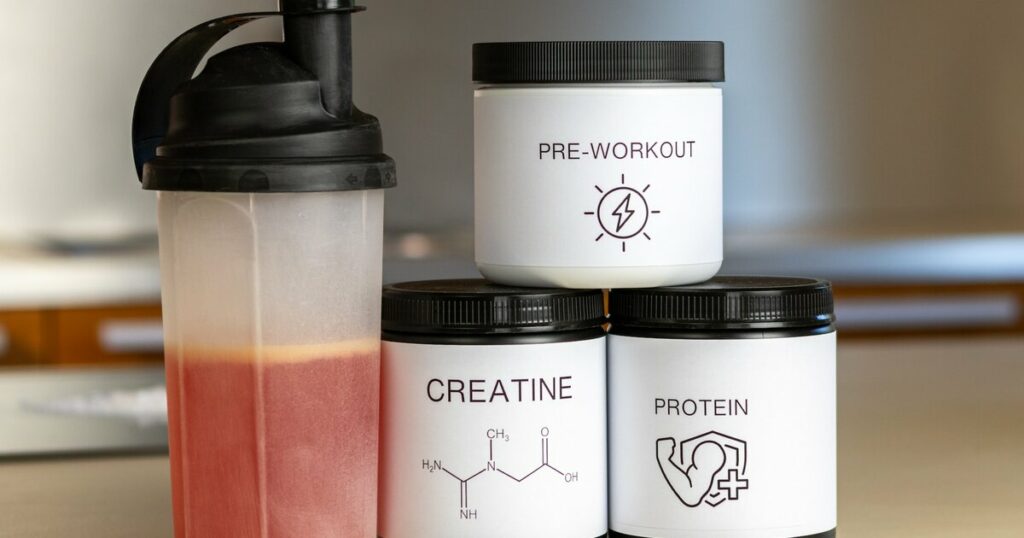Many fitness enthusiasts turn to creatine for its muscle-boosting benefits, yet some seek alternatives due to personal preferences or bodily responses. As the pursuit for optimal health and fitness continues, understanding the vast landscape of supplements is key. In this journey to find creatine substitutes, we’ll explore options that promise similar results without relying on this well-known compound. Whether it’s due to dietary restrictions, health concerns, or simply curiosity, the quest for creatine alternatives is an important exploration for those aiming to enhance their physical performance and achieve their muscle growth goals.
On this page:
Unpacking Creatine: Benefits and Drawbacks
Creatine is a naturally occurring substance within our muscle cells, and it plays a crucial role in energy production during high-intensity activities like sprinting or weightlifting. Supplementing with creatine can lead to significant improvements in muscle strength, power, and size. It acts as a quick energy source, helping replenish ATP, which is the primary energy currency in our cells. This can translate to improved performance, faster muscle growth, and enhanced recovery between workouts.
However, creatine isn’t without its drawbacks. While most people can take it without experiencing adverse effects, some may face issues like bloating, stomach discomfort, or water retention. These side effects are typically mild and temporary, but they can be off-putting for those sensitive to the supplement. Additionally, a small percentage of users may not respond to creatine supplementation, a phenomenon known as “creatine non-responders.”
Moreover, there’s a common misconception that creatine can cause dehydration or cramping, but research does not support these claims when the supplement is taken as directed. It’s also worth noting that while creatine is beneficial for short bursts of high-intensity activity, it may not offer the same performance benefits for endurance athletes, whose sports rely more on sustained, aerobic energy systems.

In sum, creatine has a proven track record for boosting performance and muscle mass, making it a go-to for athletes and bodybuilders alike. Nevertheless, it’s not a one-size-fits-all solution, and some individuals might prefer to explore alternatives due to personal preferences, specific health considerations, or a desire for variety in their supplementation regimen.
Top 5 Non-Creatine Supplements for Muscle Enhancement
When it comes to boosting your muscle mass without creatine, a variety of supplements can step up to the plate. Here are the top 5 non-creatine supplements that are popular among fitness enthusiasts:
- Branched-Chain Amino Acids (BCAAs): These are the building blocks of protein and are crucial for muscle repair and growth. Leucine, isoleucine, and valine, in particular, play a significant role in muscle protein synthesis and can help enhance muscle recovery post-workout.
- Beta-Alanine: This amino acid is known for its ability to increase carnosine levels in muscles, which can reduce fatigue during high-intensity exercise. This can translate to better performance and potentially more muscle gain over time.
- Whey Protein: Whey is a complete protein that is quickly absorbed by the body, making it perfect for post-workout recovery. It’s rich in essential amino acids needed for muscle building, including leucine which is known for its muscle growth-promoting effects.
- Citrulline Malate: Citrulline boosts nitric oxide production in the body, which can improve blood flow to your muscles, enhance endurance, and may help in muscle recovery. It’s often used in pre-workout formulas for its potential to reduce muscle soreness.
- HMB (β-Hydroxy β-Methylbutyrate): HMB is a compound that results from the breakdown of leucine. It helps preserve the structural integrity of your muscles and can support muscle growth by minimizing the breakdown of muscle protein.
Incorporating these supplements into your fitness regimen could offer you an edge in your muscle enhancement goals. Always remember to consult with a healthcare provider before starting any new supplement to ensure it aligns with your health and fitness objectives.
Diving into Diet: Best Food Sources of Natural Creatine
If you’re looking to boost your creatine intake naturally through your diet, you’re in luck. Your body already produces creatine from amino acids, but you can also find it in various food sources, particularly in meat and fish. Here’s a rundown of the best foods to consider if you’re seeking natural sources of creatine.
Red meat takes the lead, with beef and pork offering about 2 grams of creatine per pound. These meats not only help you meet your creatine needs but also provide a rich source of protein and essential nutrients. However, it’s important to opt for leaner cuts to avoid excess saturated fats.
Moving to the sea, wild-caught fish like salmon and tuna are excellent choices. A pound of these fish contains roughly 1.5 to 2 grams of creatine. Besides creatine, they’re packed with omega-3 fatty acids, which are beneficial for heart health and inflammation.
For those who enjoy poultry, chicken is a good option, delivering around 1 gram of creatine per pound. It’s a versatile protein that can easily be added to various recipes, making it simple to incorporate into your diet.
While not as high in creatine as meats and fish, eggs also offer this compound, with the added advantage of containing all the essential amino acids your body needs to synthesize its own creatine. To fully benefit from the creatine in eggs, it’s best to consume them cooked, as raw egg whites contain avidin, which can interfere with biotin absorption.
Lastly, dairy products like milk and cheese provide small amounts of creatine. These can be a good additional source, especially for vegetarians who eat dairy, and come with the bonus of calcium for bone health.
By including these foods in your meals, you can naturally increase your creatine levels, which can be especially beneficial if you’re looking to boost muscle growth and improve exercise performance without taking creatine supplements. Remember to combine these foods with a balanced diet and regular exercise for the best results.
Creatine Alternatives for Vegans: Harnessing Plant Power
For vegan athletes and fitness enthusiasts, finding a creatine alternative that aligns with plant-based values is crucial. Fortunately, the power of plants offers several options to enhance muscle growth and improve exercise performance without relying on animal-derived creatine.
One potent plant-based alternative is quinoa. This ancient grain is a complete protein, providing all nine essential amino acids necessary for muscle repair and growth. Incorporating quinoa into your diet can support your fitness goals while sticking to vegan principles.
Another excellent option for vegans is brown rice protein. Brown rice protein is rich in BCAAs (branched-chain amino acids), which play a vital role in muscle synthesis. It’s easily digestible and can aid in recovery after intense workouts, making it an effective substitute for creatine.
Algae like spirulina and chlorella are also gaining traction as creatine alternatives. These superfoods are high in protein and an array of nutrients that support muscle function. Their antioxidant properties can help reduce exercise-induced oxidative stress, promoting quicker recovery.
Beta-alanine, an amino acid found in plant-based sources like soy and legumes, is another alternative. It’s known for its ability to enhance muscular endurance and has been shown to improve performance during high-intensity activities. While not a direct substitute for creatine, beta-alanine can be a valuable component of a vegan athlete’s supplement regimen.
Lastly, nitrates found in beets and beetroot juice can improve blood flow and oxygen delivery to muscles. This can enhance exercise efficiency and stamina, which is beneficial for those looking to improve their athletic performance without creatine.
By focusing on these plant-powered alternatives, vegans can achieve their muscle-building objectives effectively. Integrating these foods and supplements into a well-balanced vegan diet can help ensure that your body has the necessary fuel to excel, both in and out of the gym.
Comparative Insight: Substitute for Creatine vs. Traditional Creatine
Traditional creatine, specifically creatine monohydrate, has been extensively studied and is well-known for its ability to increase muscle mass, strength, and exercise performance. Its track record is backed by a wealth of scientific research demonstrating its benefits for short-term high-intensity activities.

On the flip side, creatine alternatives have emerged due to various reasons such as potential side effects of creatine, dietary preferences, or simply the quest for new options. These alternatives include supplements like beta-alanine, branched-chain amino acids (BCAAs), and HMB (beta-hydroxy beta-methylbutyrate), each offering its own unique advantages. For instance, beta-alanine enhances performance by buffering lactic acid in muscles, which may benefit endurance during high-intensity workouts.
Comparing these alternatives to traditional creatine, one should note that while they may offer similar benefits, the mechanisms by which they work can differ. For example, BCAAs fuel muscles and support recovery, but they do not directly increase muscle creatine content as traditional creatine does. HMB, on the other hand, may help prevent muscle breakdown and promote recovery, which is a different route to enhancing muscle growth compared to creatine’s direct role in energy production for muscle contractions.
Safety profiles also vary, with traditional creatine being exceptionally safe for most people when taken as directed. Alternatives usually share a good safety record, yet they lack the same depth of research as creatine. Moreover, the dosage, timing, and combination with other supplements can influence the effectiveness and safety of these alternatives.
Ultimately, while creatine alternatives can be effective for muscle enhancement, their impacts are often more subtle and varied compared to the robust effects of traditional creatine. Individuals may choose alternatives based on personal preferences, specific health considerations, or to complement their existing supplementation routine, but should be aware that results can differ from those achieved with traditional creatine.
Answering Your Curiosities: Alternatives to Creatine FAQ
Can I get the same results with creatine alternatives as with creatine itself?
While creatine is unique in its performance, some alternatives may offer similar benefits. However, results can vary based on the individual, the specific alternative used, and other factors like diet and exercise.
Are there natural sources of creatine or its alternatives?
Yes, creatine is naturally found in red meat and fish. Alternatives like beta-alanine and branched-chain amino acids (BCAAs) are also present in various food sources and can be consumed through a balanced diet.
Do creatine alternatives have fewer side effects?
Some people may experience fewer side effects with alternatives, as they are often different compounds with distinct properties. But like any supplement, they can have side effects, so it’s essential to monitor your body’s response.
Is it necessary to cycle creatine alternatives?
Cycling supplements, including creatine alternatives, can be a personal choice. Some experts suggest cycling to give the body a break, while others find continuous use to be effective. Consult a healthcare professional for advice tailored to your needs.
Are alternatives to creatine suitable for all ages?
Most creatine alternatives are aimed at adults. Younger individuals, especially those under 18, should approach any supplement with caution and ideally under professional guidance.
How do I choose the best creatine alternative?
Consider your health goals, any dietary restrictions, and potential interactions with other supplements or medications. Researching each alternative and possibly consulting with a healthcare provider can help you make an informed decision.
Remember, while these answers provide a quick snapshot, it’s important to dive deeper into each topic and consider your unique situation when choosing a supplement regimen.
Making the Right Choice for Your Muscle Growth Journey
As you navigate the landscape of muscle growth supplements, choosing the right product is crucial for your health and performance. While creatine is a popular go-to, it’s not the only path to muscle gain. The alternatives we’ve explored — ranging from other supplements to natural food sources — offer a spectrum of benefits that may align better with your body’s needs and your lifestyle choices.
Remember, what works for one person might not work for another. It’s essential to consider your dietary preferences, workout intensity, and any health conditions before making a switch or starting a new supplement. Consult with a healthcare provider or a nutrition expert to get personalized advice that factors in your unique goals and circumstances.
Your muscle growth journey is personal and evolving. As you grow and change, so might your supplement needs. Stay informed about the latest research and be open to adjusting your approach as you learn more about how your body responds to different nutrients.
Ultimately, the right choice is the one that supports your health, fits your ethical beliefs, and helps you achieve your fitness goals in a sustainable way. By staying mindful and proactive about your supplement choices, you’re setting the foundation for long-term success in your muscle growth journey.



